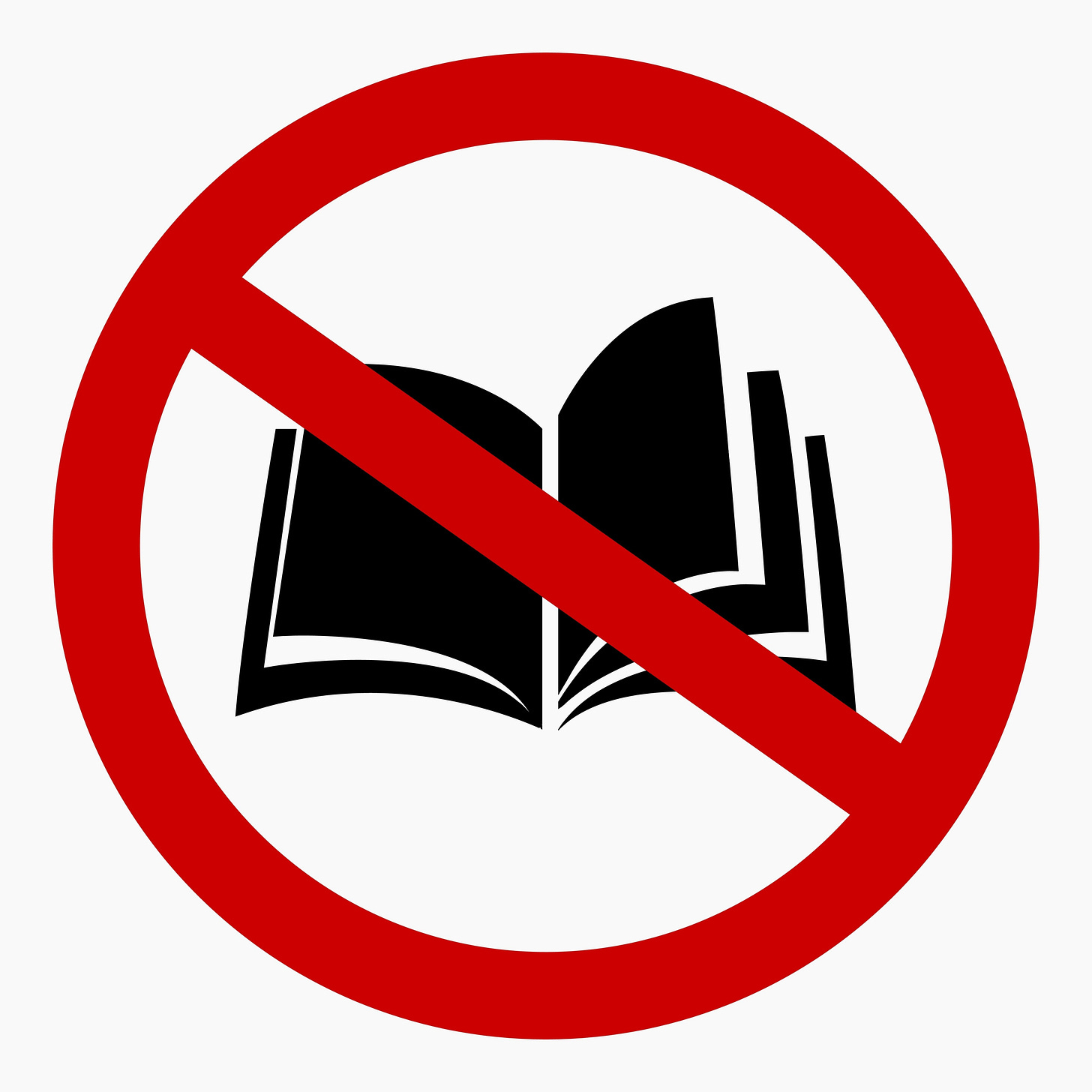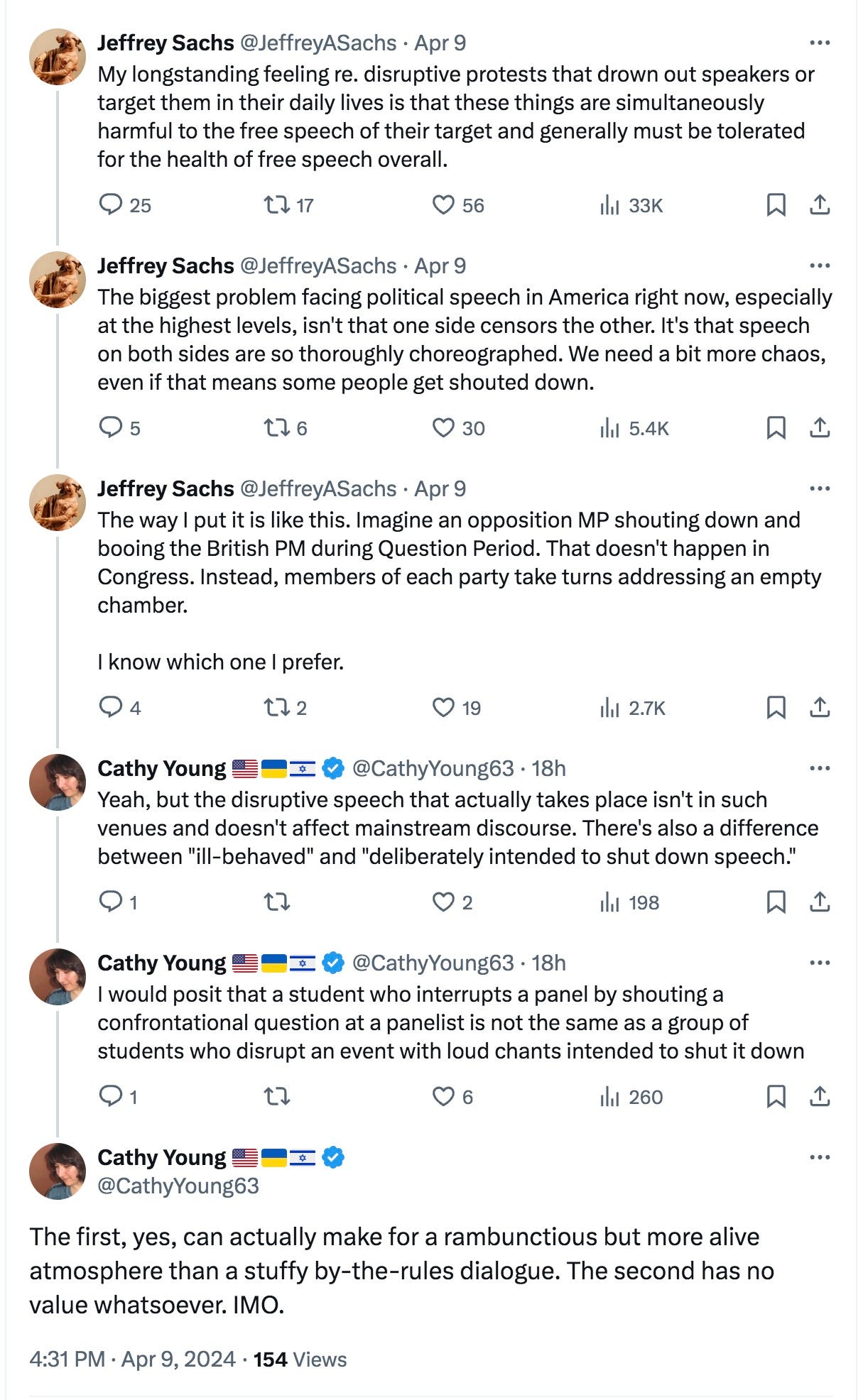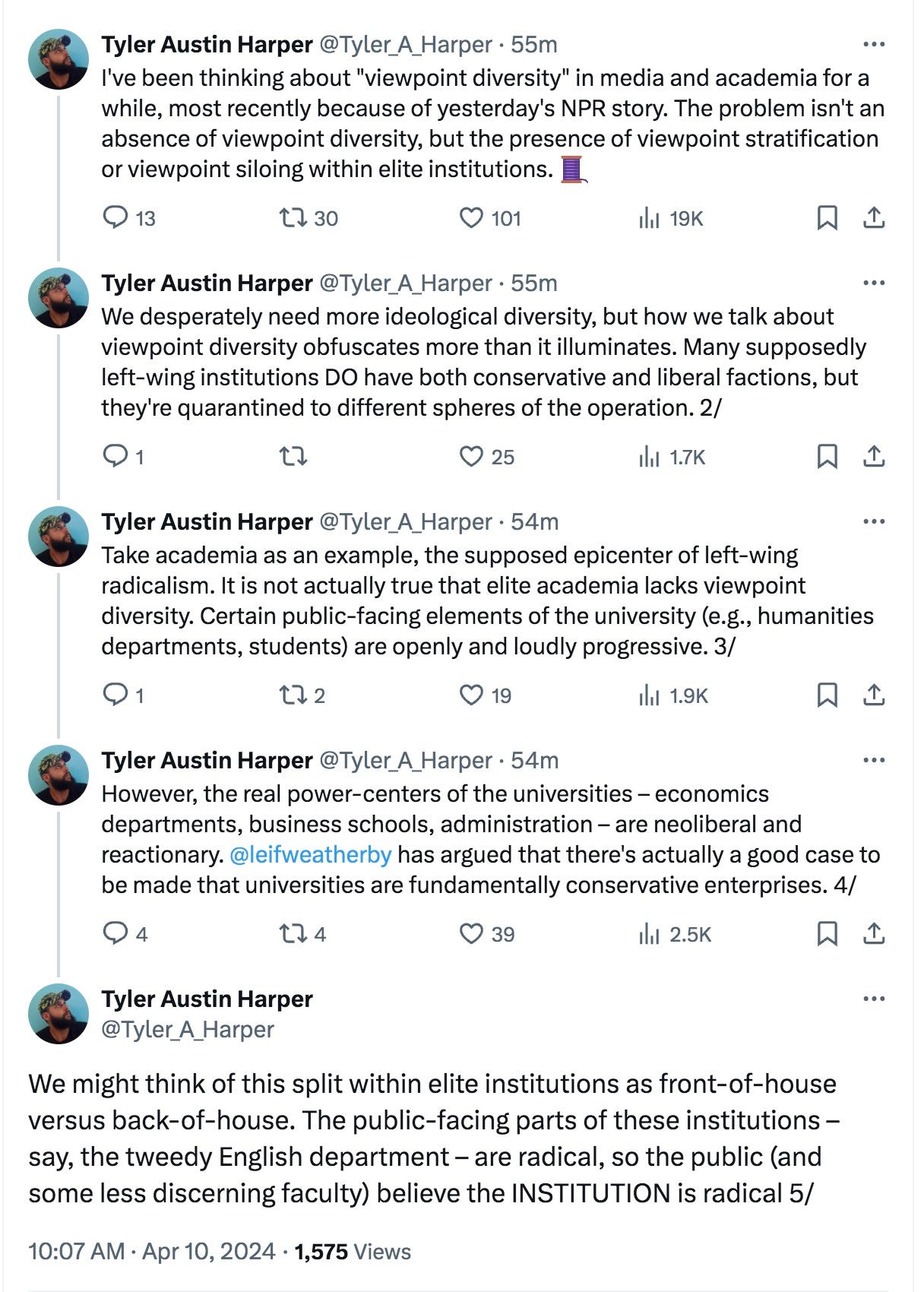E-Pluribus | April 10, 2024
Don't just yell - debate; does any of this really matter? And hating on Poland's hate speech legislation.
A round-up of the latest and best musings on the rise of illiberalism in the public discourse:
Ross Barkan: Bring Back The Culture of Debate!
Most of us would acknowledge that there is great benefit in having our beliefs challenged. Yet, Ross Barkan at Persuasion argues that too few institutions these days seem to embrace that principle. Barkan says too much of modern discourse is preaching to the choir and quashing dissenting views, and that we’re worse off for it.
[A]round a dozen staff members resigned last month from Guernica, a well-regarded literary magazine. The staffers, who were volunteers, quit after Guernica published an essay by an Israeli writer grappling with Oct. 7 and her volunteer work driving Palestinian children from the West Bank to receive care at Israeli hospitals. Joanna Chen, a translator of Hebrew and Arabic poetry, wrote about trying to reconnect with a Palestinian friend and former colleague after the attacks, and of not knowing how to respond when her friend texted back reports of Israel blasting a hospital complex in Gaza. “Beyond terrible, I finally wrote, knowing our conversation was over,” she wrote in her essay. “I felt inexplicably ashamed, as if she were pointing a finger at me. I also felt stupid—this was war, and whether I liked it or not, Nuha and I were standing at opposite ends of the very bridge I hoped to cross. I had been naïve; this conflict was bigger than the both of us.”
Guernica’s staff revolted and resigned en masse. Guernica, in turn, deleted the essay from its website. April Zhu, who resigned as a senior editor, wrote that Chen’s essay refused to trace the shape of a “violent, imperialist, colonial power” and makes the “systematic and historic dehumanization of Palestinians...a non-issue.” Rather than rebut Chen with their own essays, the writers chose to leave Guernica; Guernica itself, rather than offer a forum for debate, erased the piece altogether. Better to pretend a certain kind of wrongthink never existed than to battle it out in the public square.
A strange, if inevitable, flattening has come with digital life. So many journals and publications sound alike—their politics indistinguishable, the writers circulating between them interchangeable. On Israel and Gaza, there are genuine divides borne out in American institutions that, when it comes to your typical online publication or journal, are not as evident. If a publication is outwardly conservative or Republican-aligned, it is no less a monoculture. Slavish devotion to Donald Trump (and the Israeli perspective) is de rigueur. Meaningful debate will not happen.
[. . .]
On the left, the old Village Voice culture has faded. But the so-called anti-woke side can’t be said to be much better. Israel, again, is the instructive example. If critics of Israel are guilty of rhetorical excess, Israel’s supporters are prepared to match or even exceed them. In fact, it’s those who are most supportive of Israel who have adopted many of the same pathologies as the woke, treating debate and ideas themselves as mortal threats and defaulting, whenever possible, to their identity concerns. Standpoint epistemology dominates everywhere.
[. . .]
People don’t shout at one another; they beseech the hall monitors above to ensure no one gets to shout at all. Guernica staffers cannot countenance someone who is not resolutely anti-Zionist. Israel hawks fight a holy war to get every pro-Palestine chapter purged from campus, every speaker banned, every bit of language placed off-limits. It all makes for the most suffocating of political climates. Long ago, in the heyday of print and the hothouse debate culture, the two sides could hash it out in newspapers, magazines, and debate panels, challenging each other, in the moment at least, to think critically. Those practices, absent some YouTube channels, podcasts, and Substacks, have gone out of fashion.
Read it all.
George Case: Ignore This Article
Most of us are capable of consuming more information in a single day than most people centuries ago would see in many years, if not their entire lives. At Quillette, George Case calls into question the ultimate value of a growing segment of this information tsunami: commentary (opinion, reviews, analyses, etc.) Is it too much of a good thing? And how good is much of it anyway?
For some time now, we have been hearing ominous warnings about the death of journalism and its consequences for society. Venerable daily newspapers have folded for good; foreign desks that relayed occurrences from distant places have been closed in budget cuts; broadcast outlets whose reporters and anchors made sense of a chaotic world have lost their audiences to social media; trusted sources have been displaced by trolls, tweets, and TikTok. “Is Democracy Written In Disappearing Ink?” asked a Toronto Globe and Mail essay in 2009. In 2021, an Atlantic investigation reported that “A Secretive Hedge Fund is Gutting Newsrooms,” while a later story in the same magazine wondered, “Is Journalism Headed Toward an ‘Extinction-Level Event’?” Recent books about this worrisome trend include Postmedia: How Vulture Capitalism is Wrecking Our News, Will the Last Reporter Please Turn Out the Lights, Losing the News, and The Vanishing Newspaper. But while journalism’s decline is a legitimate concern, the related enterprise of commentary—opinion, reviews, analyses, editorials—is flourishing as never before. Or is this also troubling?
[. . .]
[I]f journalism is the first draft of history, op-eds and commentaries are the handwritten notes scrawled in the margins—humanizing perspectives on phenomena otherwise described merely as raw data or dry facts. A handful of these are remembered for their enduring significance: novelist Émile Zola’s open letter “J ’Accuse,” published in L’Aurore in 1898, charged the French government with antisemitism in the Dreyfus affair; Henry Luce’s “The American Century,” a call to US global leadership, appeared in his flagship magazine Life a few months before Pearl Harbor; Orwell’s widely quoted “Politics and the English Language” excoriated journalistic double-talk in a Horizon issue of 1946; even the perennial “Yes, Virginia, There is a Santa Claus,” the New York Sun’s 1897 answer to the wavering faith of eight-year-old Virginia O’Hanlon.
[. . .]
Yet among the countless articles and words devoted to the expression of opinion in the last 150 years, the vast majority are forgotten endorsements of a status quo, or futile critiques from the sidelines that were soon overtaken by events. And that’s just the universe of print; since the millennium, a new galaxy of digital platforms such as Slate, Vox, Salon, the Daily Beast, the Huffington Post, UnHerd, Compact, and the Free Press—along with the online editions of legacy media like the BBC, CNN, al-Jazeera, the New York Times, and the Atlantic—present endless, constantly replenished tsunamis of content, most of it not old-fashioned shoe-leather reporting but armchair assessments of the same news or commercial publicity streamed in from everywhere. It’s been called the opinion-industrial complex, a 24-hour, profit-driven churn of rhetoric and diatribe. And the DIY networks of Facebook, Substack, Medium, Wordpress, and Twitter, as well as the limitless comment fields of YouTube, Reddit, and Amazon, hold further gigabytes of input from virtual nations of ordinary, anonymous users. It’s the future, and everyone’s a pundit for 15 minutes.
That’s not to say that the material they generate is necessarily bad writing or shallow thinking. The op-eds of yesteryear and the blogs and posts of today constitute a wide-ranging public conversation, some of it profound, that’s a necessary element of democratic societies. Conversation is really just ideas, though, and ideas are not reality. Like the private musings inside our own heads, they might not—or should not—be manifested in outward action.
Read it all here.
Michal Kranz: Poland pushes ahead with hardline hate speech law
As the US civil rights movement demonstrated, trying to quash a society’s worst impulses and practices is a worthy goal. But the same can’t always be said of speech restrictions. Writing for UnHerd, Michal Kranz asserts, for example, that Poland’s apparently noble intention to prevent “hate speech” is misguided and dangerous.
Merely a year ago, it would have seemed unthinkable that the government of a country like Poland should propose a law that would put people behind bars for hate speech against LGBT people. Yet that’s exactly what happened late last month. In an effort to make good on the new centre-left Polish government’s campaign promises, the country’s Ministry of Justice proposed draft amendments that would impose a sentence of up to three years in prison for an array of actions ranging from the use of violence to vague insults against people based on their sexual orientation, gender identity, or other factors.
[. . .]
Prime Minister Donald Tusk’s government seems to have taken the same sledgehammer approach to this issue as it has to others since taking power late last year, and by introducing ambiguity into the Polish legal code on a matter that is so crucially in need of precise and careful reform, the Polish state risks throwing the baby out with the bathwater. By leaving crucial terms such as “insults” and “call for hatred” up to legal interpretation, the new amendments potentially allow legitimate non-hateful speech to become caught in the crossfire.
Years of inflammatory actions by state authorities like the establishment of LGBT-free zones and personal attacks against activists have made the debates around LGBT rights in Poland just as emotionally charged as those around other lightening-rod issues like abortion. Yet like many emotionally-driven reforms, the unscrupulous and inexact language present in the new law is hardly an adequate solution to Poland’s historic intolerance of LGBT rights.
[. . .]
If Poland wants to correct course on LGBT rights, as it eagerly should, it must be careful not to repeat the mistakes of its recent past. Tusk’s government must do everything in its power to protect LGBT people while also putting up guardrails to make witch hunts of the sort that took place under PiS impossible. As it stands, the current version of the law only satisfies one of these requirements.
Read the whole thing.
Around Twitter (X)
Here are Jeffrey Sachs and Cathy Young with contrasting takes on “disruptive speech”:
Tyler Austin Harper posted a long thread today on viewpoint diversity; excerpt below, but click through for the whole thread.
And finally, Dan McLaughlin with an Alexis de Tocqueville quote that boils down to “man up!”









